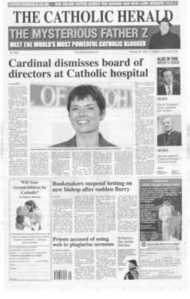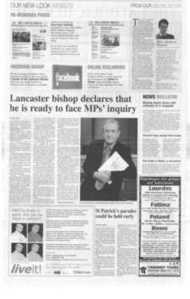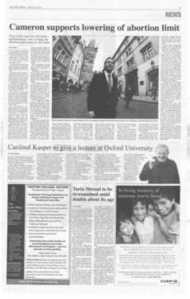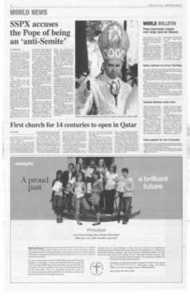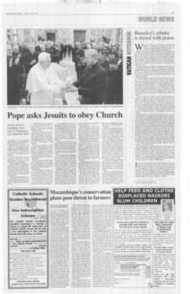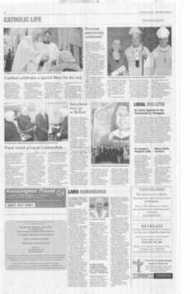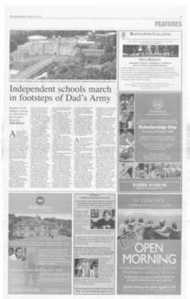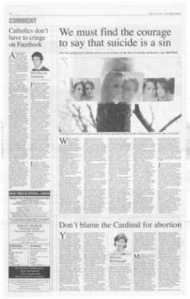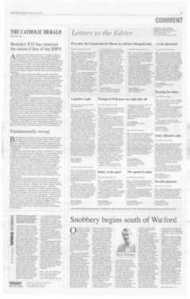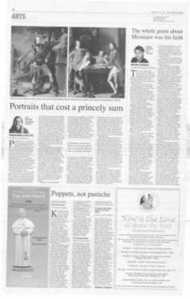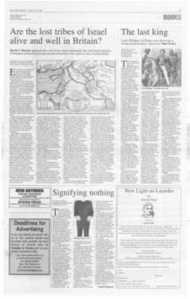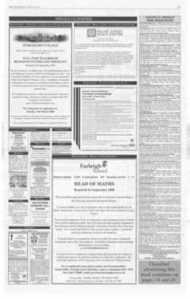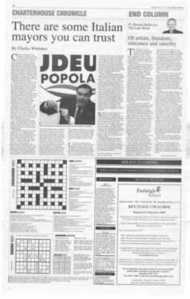Page 4, 29th February 2008
Page 4
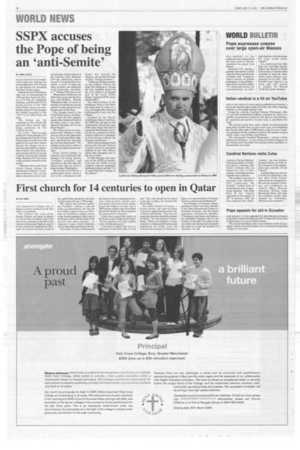
Report an error
Noticed an error on this page?If you've noticed an error in this article please click here to report it.
Tags
Share
Related articles
Lefebvrists Face Crisis As Bishop Is Exposed As...
Benedict Xvi Has Removed The Raison D'être Of The Sspx
Lefebvrists Snub Pope's Call For Unity
New Williamson Claims Could Harm Vatican Talks With Sspx
Haunted By The Sspx
SSPX accuses the Pope of being an 'anti-Semite'
BY ANNA ARCO
ONE OF THE FOUR excommunicated Lefebvrist bishops has accused Benedict XVI of being an anti-Semite for amending the Good Friday prayer.
Bishop Richard Williamson, who was excommunicated in 1988 and now heads the Society of St Pius X's Argentine seminary, said Benedict XVI's recent revision of the 1962 Good Friday prayer was antiSemitic because it had stopped the faithful praying for the "veil" to be lifted from the Jews.
The bishop put the comments on his website but removed them shortly after being contacted by The Catholic Herald.
He wrote: "Most people seeing how Pope Benedict XVI has changed the Church's Good Friday prayer for the Jews will think he has been their Mend, because the change was in a direction demanded by spokesmen of theirs, who made themselves heard. However, for any Catholic who has the Catholic Faith, Benedict XVI has been in this not their friend but their enemy.
—Therefore the recent Good Friday liturgy change, by diminishing Catholics' awareness of that real 'veil', etc, has done a disservice to Jews' eter nal salvation. In this respect of the Catholic Faith, Benedict XVI has, objectively, shown himself to be against the Jews purely as Jews. Is there any other possible true definition of the expression 'anti-Semite'?" Bishop Williamson said.
When asked whether he was effectively saying that the Pope was anti-Semitic, Bishop Williamson said: "It seems to me that you would best get the answer to that question from the last post on the blog."
The changes made to the Good Friday prayer on February 5 were the first changes made to the traditional form of the Mass since it was liberalised by Benedict XVI in his Motu Proprio.
The Pope removed references to the "blindness" of the Jews as well as the appeal that they "be delivered from darkness" and that God "may take the veil from their hearts". The change to the prayer, which is in Latin, has drawn mixed macdons.
Some Jewish leaders in America have criticised the changes for being merely "cosmetic revisions" and objected to the fact that the prayer still calls on Jews to acknowledge Christianity.
The Society of St Pius X, a traditionalist group which is not in full communion with Rome, has rejected the changes, saying that the Pope caved to "foreign pressures".
"Following foreign pressures on the Catholic Church, the Pope felt obligated to change the very venerable prayer for the Jews which is an integral part of the Good Friday liturgy," said the SSPX's news service DIG.
The liberalisation of the traditional form of the Mass has been seen by many as a way of bringing the estranged traditionalists back into the Church.
Founded by the French Archbishop Marcel Lefebvre, the SSPX has not been in full communion with Rome since 1988 when Pope John Paul II issued the Mom Proprio Ecciesia Del as a reaction to Archbishop Lefebvre's ordination of four bishops without the Vatican's permission.
SSPX rejected changes made during the Second Vatican Council and have remained faithful to the 1962 Missal rather than changing over to the Novus Ordo.
Fr Paul Morgan, the superior of the SSPX in Britain, said that the SSPX would continue using the unchanged traditional prayers and that "we do regret the Pope's change of the prayers".
blog comments powered by Disqus


